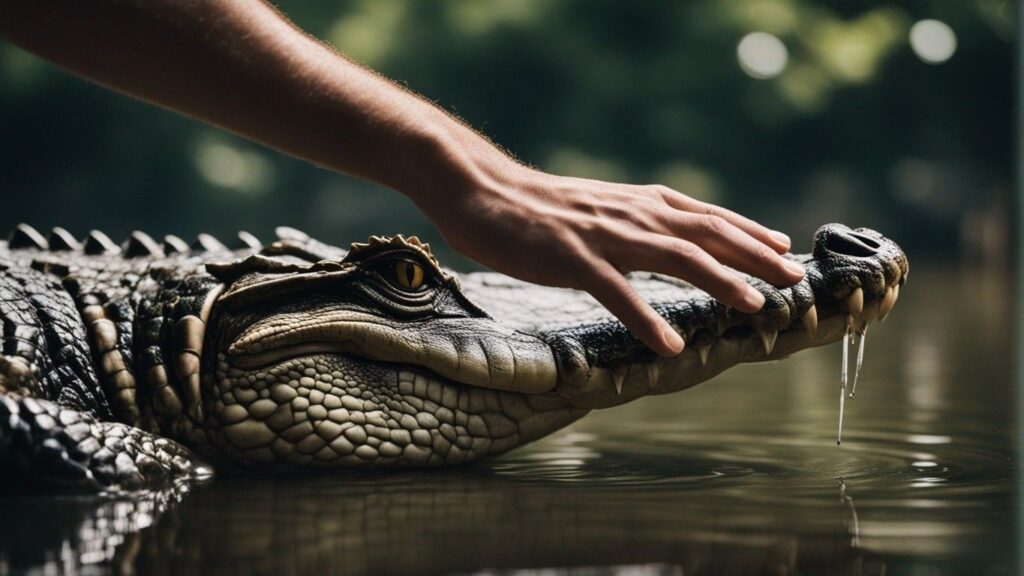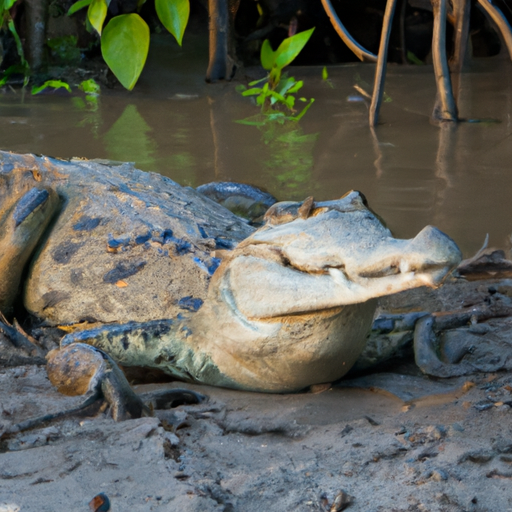So you’ve heard about the fascinating wildlife in New Zealand, from its unique birds to its marine life. But are there any crocodiles lurking in the country’s wilderness?
The answer may surprise you. Despite its abundance of natural beauty, New Zealand is fortunate enough to be crocodile-free.
That’s right, you won’t have to worry about encountering these formidable creatures while exploring the stunning landscapes of the Land of the Long White Cloud.
So let’s dive into this article and discover why New Zealand remains a safe haven from these ancient reptiles.
Does New Zealand Have Crocodiles
New Zealand is well-known for its stunning landscapes, diverse wildlife, and unique biodiversity. The country is home to a wide array of native species, but one animal you won’t find lurking in the rivers or basking in the sun is the crocodile. Despite being surrounded by water and some reptiles calling the islands home, there are no native crocodile species in New Zealand. In this article, we will explore the absence of crocodiles in New Zealand and delve into the reasons behind their non-existence.
Overview of New Zealand Wildlife
Before we dive into the details of crocodile absence, let’s take a moment to appreciate the incredible wildlife that does inhabit New Zealand. Known for its biodiversity, the country boasts a unique collection of flora and fauna. Due to its isolation, New Zealand developed a distinct ecosystem, with many unique species found nowhere else in the world.
One notable characteristic of New Zealand’s wildlife is the absence of land mammals. Unlike most countries, which have a diverse range of mammals, New Zealand is devoid of native land-dwelling mammals. Instead, the ecology of the islands is dominated by birds, reptiles, and marine life.
Speaking of marine life, the surrounding oceans are teeming with diverse species. From colorful fish to majestic whales, the waters around New Zealand offer a magnificent variety of marine creatures. Whether you’re exploring the coastal waters or delving into the depths of the ocean, you’re sure to encounter a mesmerizing array of marine biodiversity.
Native Reptiles in New Zealand
While crocodiles may be absent from New Zealand, the islands are home to several native reptile species. One of the most fascinating reptiles found in the country is the tuatara. Often referred to as a living fossil, tuatara are the only surviving members of an ancient reptilian order that thrived during the age of dinosaurs.
In addition to tuatara, New Zealand is home to various species of skinks and geckos. These reptiles are found in different habitats throughout the islands and contribute to the unique reptilian biodiversity of New Zealand. While they may not be as ferocious or menacing as crocodiles, these native reptiles have their own charm and appeal.
Crocodile Habitats and Countries
Crocodiles are mainly found in tropical and subtropical regions around the world. These fierce reptiles thrive in warm, aquatic environments, such as rivers, lakes, swamps, and estuaries. While crocodiles can adapt to various habitats, they rely on warm temperatures and accessible water sources for survival.
Countries such as Australia, Indonesia, Malaysia, the United States (Florida), and many others are home to native crocodile species. These regions provide the ideal conditions for crocodiles to thrive, with abundant water sources, suitable temperatures, and ample food supplies.
The Absence of Crocodiles in New Zealand
Despite having a diverse range of reptiles, New Zealand is devoid of any native crocodile species. If you were hoping to spot a crocodile lurking in the waters or sunbathing on the riverbanks during your visit, you would be sorely disappointed.
The absence of crocodiles in New Zealand is not a recent development. There are no records of native crocodile species ever existing on the islands, and no fossil evidence to suggest their presence in the distant past. This begs the question: why are crocodiles absent from this otherwise biodiverse nation?
Historical Background on Crocodile Presence
To understand why crocodiles are absent in New Zealand, it is essential to delve into the historical background of the reptiles’ presence. Crocodiles have inhabited Earth for millions of years and once had an extensive distribution across various continents. Fossil records reveal that crocodile relatives existed in what is now New Zealand during the age of dinosaurs.
However, as the landmasses shifted and separated over millions of years, crocodiles gradually disappeared from areas that later became modern-day New Zealand. As a result, the islands ended up isolated from the regions where crocodiles continued to thrive.
The Reasoning Behind the Absence
The absence of crocodiles in New Zealand can be attributed to several factors, including geographical isolation, climate, and limited dispersal abilities of the reptiles.
New Zealand’s geographical isolation played a crucial role in shaping its unique biodiversity. The islands separated from the continents millions of years ago, resulting in a lack of land-dwelling mammals and limited reptile species. Crocodiles, being reliant on accessible water sources and warm temperatures, simply did not make their way to the isolated islands.
Additionally, New Zealand’s climate and environmental factors may not have provided the ideal conditions for crocodile survival. The islands experience milder temperatures compared to tropical and subtropical regions where crocodiles thrive. The absence of suitable habitats and climatic conditions could have hindered the establishment and survival of crocodiles in New Zealand.
Furthermore, crocodiles have limited dispersal abilities, as they are primarily aquatic creatures. Unlike birds or mammals that can traverse large distances, crocodiles are more confined to their immediate habitat. As a result, the chances of crocodiles naturally dispersing to a geographically isolated landmass like New Zealand were slim.
Misconceptions About Crocodile Sightings
Despite the absence of native crocodile species, there have been occasional reports of crocodile sightings in New Zealand. These sightings have often sparked interest and fueled discussion among locals and tourists alike. However, further investigation and verification have consistently revealed that these sightings were the result of misidentification or hoaxes.
There are various reasons why crocodile sightings can be misleading. Native reptile species such as large skinks or geckos could be mistaken for juvenile crocodiles due to their similar body shape and scales. Moreover, log or driftwood floating in the water can often create an illusion of a crocodile’s distinctive snout or back, leading to false alarms.
While the occasional mistaken sighting may capture attention, it is important to rely on scientific evidence and expert knowledge to determine the presence or absence of crocodiles in New Zealand.
Introduced Reptile Species in New Zealand
While New Zealand may lack native crocodiles, it is not entirely free of reptiles. Over the years, several reptile species have been introduced to the islands, either intentionally or accidentally, primarily through human activities. These introduced reptiles have had varying impacts on the local ecosystems and wildlife.
Invasive reptile species can have detrimental effects on native flora and fauna. They may compete with native species for resources, prey on local wildlife, or disturb the delicate balance of ecosystems. To mitigate these impacts, measures have been implemented to control and manage introduced reptiles in New Zealand.
Examples of introduced reptile species in New Zealand include the common wall lizard, brown tree snake, and red-eared slider turtle. While they may not pose the same level of threat as crocodiles, these introduced reptiles serve as a reminder of the challenges associated with maintaining biodiversity and managing invasive species.
Potential Impacts if Crocodiles Were Present
If crocodiles were to be introduced or somehow found their way to New Zealand, the potential impacts on the native wildlife and ecosystems could be severe. Crocodiles are apex predators and have a significant influence on their respective ecosystems. Being top predators, they can affect population dynamics, alter food webs, and even shape the behavior of other species.
The absence of crocodiles in New Zealand has allowed the unique flora and fauna to evolve and adapt without the presence of such a formidable predator. The introduction of crocodiles could disrupt the delicate balance, potentially leading to changes in population sizes, distribution patterns, and prey availability.
Despite their dangerous nature, crocodiles play a crucial role in maintaining healthy ecosystems, and their introduction to a country like New Zealand could have far-reaching ecological consequences.
Final Thoughts
In conclusion, New Zealand, with its remarkable biodiversity and stunning wildlife, does not have native crocodile species.
The absence of crocodiles is a result of the country’s geographical isolation, climate, and limited dispersal abilities of these reptiles.
While occasional mistaken sightings have sparked interest, scientific evidence and historical background firmly establish the absence of crocodiles in New Zealand.
New Zealand’s unique flora and fauna serve as a testament to the country’s isolation and the resilience of its ecosystems.
While the absence of crocodiles may disappoint some wildlife enthusiasts, the islands offer a captivating array of native reptiles, diverse marine life, and a delicate balance of species that make New Zealand a truly extraordinary destination for nature lovers.




